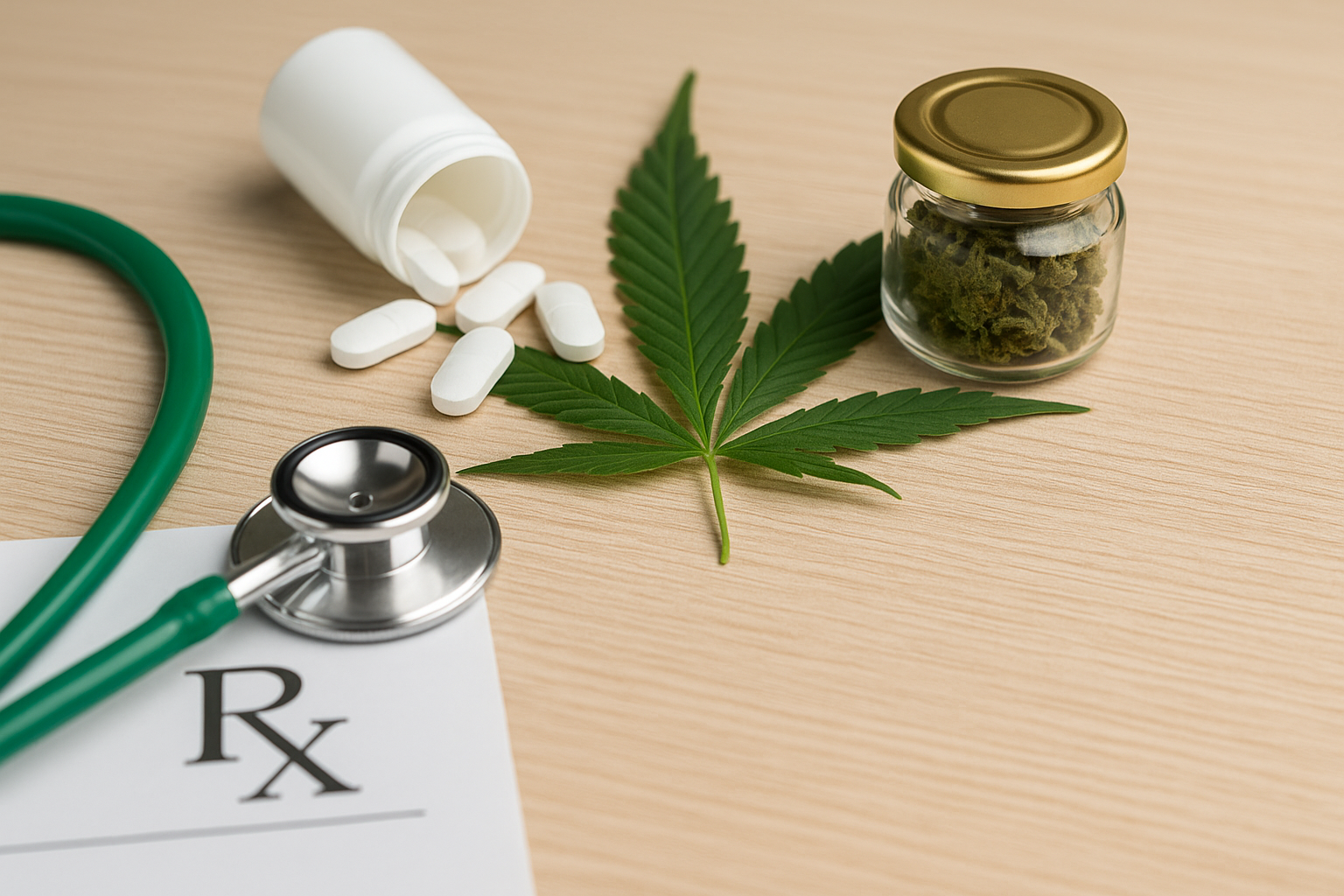It’s important to talk to your doctor about cannabis for effective treatment.
It’s also much more difficult to discuss marijuana use with a doctor for many patients. If you use marijuana medicinally for pain, anxiety, or sleep problems, please discuss it with your doctor. Despite the growing acceptance of marijuana for medical use, most doctors are unaware of its risks and benefits. This leaves patients at a loss when trying to figure out how to bring up such an issue in conversation.
Patients should feel empowered to talk to your doctor about cannabis and its benefits.
This blog will teach patients how best to talk with their doctor about cannabis and provide practical suggestions and strategies on the issue.
Why Is It Important to Talk to Your Doctor About Cannabis?
More and more people are toking up for chronic pain, anxiety, depression, and other ills that don’t respond to conventional treatments that work on the endocannabinoid system. Cannabis is not psychoactive and, unlike marijuana, does not cause a high; its breakdown products are stored in fat. Patients should consider talking to their primary care doctors about this.
Don’t hesitate to talk to your doctor about cannabis if you’re considering it for chronic pain.
Safety and Interactions: Marijuana can have interactions with medications, including blood thinners, antidepressants or pain medicine. “I need to know about your cannabis use.” Your doctor needs to be aware of your Cannabis usage due to drug interactions.
Custom Care: Your doctor can help advise on doses, delivery method (smoke, vape, tincture) and potential side effects to make sure your particular brand of marijuana use is the one that best serves your health needs.
It’s crucial to talk to your doctor about cannabis when discussing your treatment options.
Cannabis is one of several components of an overall treatment plan. When you’re open about your cannabis use, your doctor can treat all of you (rather than only the parts they can see) and include your cannabis use in an overarching treatment plan for you.
Being honest and proactive to talk to your doctor about cannabis can lead to better health outcomes.
Preparing for the Conversation with Your Primary Care Doctor
It’s a good idea to be prepared before you broach the subject of your cannabis use at your appointment. Here’s what to know before entering the conversation:
Preparation will help you talk to your doctor about cannabis at your next appointment.
Educate Yourself On How You Consume Weed
If you have been using cannabis to manage a health condition, you should ensure there is documentation of the details. Here are the things to think about, and be prepared to provide to your doctor:
Make sure you can clearly articulate why you want to talk to your doctor about cannabis.
If you have been using cannabis to manage a health condition, ensure there is documentation of the details. Here are the things to think about, and be prepared to provide to your doctor:
Strain: Multiple strains of cannabis have various effects. Indicas are typically used for pain relief and sleep problems, and sativas to elevate mood and boost energy. You should be ready to tell them which strain you are on.
Discussing your strain choice is part of why you should talk to your doctor about cannabis.
Dosage: Both the dosing and mode of consumption (oils, edibles or smoked/vaped cannabis) are paramount. Take note of how much you use, how frequently and when. This information will let your doctor know if your dosage is working.
Dosage: There are many different ways to consume cannabis, and each type of consumption results in a different effect on the mind and body. Smoking or vaping is fast-acting but short-lived, and edibles or tinctures are slow to take effect but last longer.
Timing: Track how often you use cannabis — daily, weekly or as needed. Then your doctor can have a better idea about where cannabis might fit in as part of your overall treatment.
Timing is key; don’t wait too long to talk to your doctor about cannabis.
Be Prepared to Explain Why You Consume Cannabis
Cannabis is not a “one-size-fits-all” medicine. It’s essential to justify why you are using it, how it comes into play, and why you believe in its efficacy. Are you in pain with chronic conditions, looking to decrease your stress, or improve sleep? A clear explanation can help your doctor understand how cannabis is benefiting you and where it fits into your treatment plan.
Your doctor will appreciate when you talk to them about cannabis in detail.
Understand Your Rights: The Law and the MMJ Card
If you live in a state that permits medical cannabis, you might possess a medical marijuana card. Be ready to tell the story of how you came by your card and what its benefits are. Specific conditions you must have to qualify for medical cannabis vary by state, so this information can be useful when discussing the topic with your physician.
Understanding your rights can empower you to talk to your doctor about cannabis.
If you live in a state that permits medical cannabis, you might possess a medical marijuana card. Be ready to tell the story of how you came by your card and what its benefits are. Specific conditions you must have to qualify for medical cannabis, and some other simple guidelines vary by state, so this can be useful when discussing the topic with your physician.
How to Start the Conversation with Your Doctor About Cannabis
It’s important to know how to start the conversation to talk to your doctor about cannabis.
At first, it might seem intimidating to talk with your doctor about cannabis use, but a candid conversation can help you constructively address the subject together. Lockdown Love: To help get you going and to steer the conversation.
Opening up can help you talk to your doctor about cannabis effectively.
Start the Conversation Early Don’t save your cannabis use for the end of your appointment. Bring it up early in the process — maybe when the question about your medical history is asked or you’re updating what meds you take now. This way, the conversation does not fall into dead air, and your doctor has time to ascertain how cannabis is working for you.
Timing the discussion is essential when you talk to your doctor about cannabis use.
Be Honest, but Respectful Be open and upfront about your cannabis use, though you might have to face the reality that, as well-read as your doctor is, they may not know as much about this issue. Raise them with respect, say it’s an uncomfortable topic, and acknowledge that you trust your doctor’s judgment. Say you are happy to work with them to find the best means of treating you and your health.
Being honest can really help when you talk to your doctor about cannabis.
Ask for a Collaborative Approach Doctors wishing a certain type of intervention can be invited to provide it, and they are best-trained to provide options tailored to individual needs. Regarding cannabis, advise your doctor to think of it as just one piece in the larger treatment puzzle. Explain that you appreciate their expertise and are willing to take their advice.
Be Open to Feedback If your physician is hesitant or isn’t well-versed in medical cannabis, be receptive to their input. Be open to learn more. For example:
I get it when you worry about weed. Can you direct me to some good resources?
By being open and collaborative, you show that you are invested in making informed judgments about your health.
By being respectful, you create a space to talk to your doctor about cannabis.
Conclusion
Talking to a doctor about using cannabis may seem intimidating, but it is an important step in getting the best care possible. You can bridge this gap in communication and still receive safe and effective care by discussing it openly with your provider, being honest with them — but also respectful of their concerns — and by creating a treatment plan that has space for cannabis safely.
Talking openly with your doctor about cannabis can lead to better health, a more thoughtful treatment plan, and a stronger doctor-patient relationship.
Talking openly with your doctor about cannabis can lead to better health, a more thoughtful treatment plan, and a stronger doctor-patient relationship.
Ultimately, when it comes to your health, it is crucial to talk to your doctor about cannabis.
Always remember to talk to your doctor about cannabis to facilitate better health outcomes.
Regularly talk to your doctor about cannabis to keep your care on track.
Make sure to talk to your doctor about cannabis as part of your healthcare discussions.
It is vital to talk to your doctor about cannabis to ensure safe and effective treatment.
In conclusion, it is crucial to talk to your doctor about cannabis to ensure a comprehensive approach to your health and well-being.
In summary, it’s vital to talk to your doctor about cannabis for better health outcomes.





